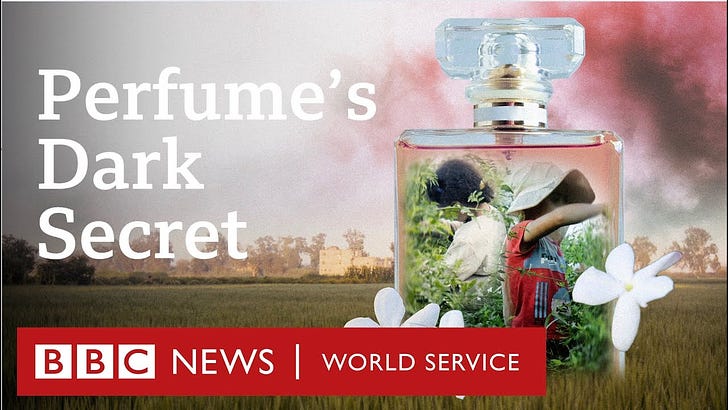Jasmine and the small town with working children
In 2024, should anyone condone child labor for fragrances?
I just finished my first of two perfumery courses at Pratt Institute for a certificate. It was a pure delight. But something happened this week that rightfully changed the discourse on perfumes, so let’s discuss it.
It’s difficult to capture the impact of labor conditions on Jasmine farming for the fragrance industry. Farmers may have used child labor for hundreds of years—the flower’s soothing, inviting aroma has ancient provenance, dating back to at least the fifth century BCE, long before labor rights existed in any country.
Jasmine’s valued legacy is not treated with equal compensatory value: One ton is bought from a farmer for about $760 USD and produced into materials worth tens of thousands when used in commercial products. As the BBC’s Jasmine documentary fleshed out, some farmers are resorting to bringing their children along to pick the delicate flowers, so they can earn more.
In 2024, should child labor for fragrances continue? Anyone who loves and buys fragrances should be gravely concerned about the prevalence of child labor in jasmine farming. Here are a few broad takeaways based on reporting about Egypt’s prized Nile Delta Jasmine farming.
"The auditors are only auditing what they're paid to audit."—Sarah Dadush, founder of the Responsible Contracting Project
The small town of Shubra Beloula is critically important to international jasmine supply. According to the country’s Cabinet Information and Decision Support Center (IDSC), Egypt accounted for an estimated 50 percent of global jasmine production in 2023. Shubra Beloula produces 75 percent of the country’s Jasmine—and half of the estimated 50,000 residents working in the sector live here.
In Egypt, it is illegal for children younger than 15 to work between 7am and 7pm. Jasmine needs to be picked early in the morning, around dawn, to preserve as much quality in the flowers as possible to extract its luxurious, prized aroma. Farmers do not receive wages the way an hourly worker might — they receive income based on the amount they pick and can successfully sell to a local cooperative. This means there is an incentive to work as much as possible to physically collect these delicate flowers—including using one’s own children, perhaps in the same way that farmers worked when they were children themselves.
The Jasmine industry is grappling with a multitude of large challenges. Competition from India, the disruptive impact of the Covid-19 pandemic, and the looming threat of climate change. All of it takes a toll on Egypt’s Jasmine production and sales. A review of the town’s practices and interviews with experts in 2022 shed light on the market challenges the sector (and thereby this small town, specifically) faces.
"Ahead of this year's harvest in June, a detailed action plan is in place with suppliers and our teams will be in Egypt evaluating their success."—L’Oreal, in response to BBC’s report
It is not clear what aspects of Jasmine pose environmental and health risks. There are concerns about certain chemicals, as highlighted by Givaudan’s efforts to train farmers in what they call “sustainable practices,” such as using organic fertilizer to preserve the quality of harvested flowers. Givaudan is one of the companies cited by the BBC investigation as buying from the farms in Egypt where it found child labor.
But sustainable farming may not change the health problems the recent BBC investigation found. And it is unclear what oversight Givaudan has over the use of pesticides for growing the jasmine it buys from Egypt, anyway. Is it only pesticides causing problems—or is Jasmine dangerous to pick with or without sustainable practices? Why would any company promote dangerous, organic farming? Either way, Givaudan claimed to find the BBC report “deeply alarming.” However…
This is not the first time the BBC has reported child labor in the country’s Jasmine farming. In 2022, the BBC shared this quote (bolded for emphasis): Everyone in this village from the eldest to the youngest picks jasmine flowers," said jasmine picker Mohamed Faraj. "Kids as young as seven years old wake up by dawn, pick [J]asmine for a few hours then head to school. I used to do so since I was nine years old."
This is not the first time child labor in Shubra Beloula has been documented. I found a 2020 report by AFP with a farmer stating they have worked in the industry since childhood. That’s how the labor is paid for (not hourly, but by the weight of flowers picked).
What to make of this? It’s impossible for me to pass judgment on the parents who ask for their children’s help in low-income circumstances, but for now, perfumeheads like me can track what companies are doing to audit farming practices through their marketing, including social media, where materials are often promoted as a justification for the huge price tags of perfumes and home fragrances.
But knowing that this has been going on since at least 2020 makes my stomach turn.
Perfumer-in-my-residence,
Margarita


